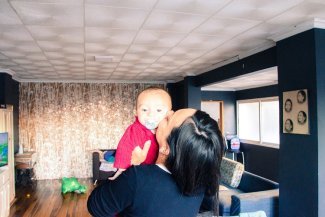“We are fighting to ensure that, in the future, balancing motherhood with work won’t be a utopia for our daughters,” says Laura Baena of Spain. This publicist by training ended up leaving her career behind to take care of her three daughters and founded Club de Malasmadres (The Bad Mothers’Club), which has already been joined by over a million women.
Club de Malasmadres (The Bad Mothers’ Club) was born in 2015, on Twitter, as a new mother’s “night time vent”. It has become a benchmark in the fight for equality in Spanish-speaking countries, with a community of more than one million ‘bad mothers’. Without losing sight of her initial aim of “demystifying motherhood and breaking with the myth of the perfect mother,” it is with a good dose of humour and through awareness-raising campaigns that 39-year-old Laura Baena and her club try to break down sexist taboos and barriers, voicing the demands of the woman on the street, to make them heard by those in power.
“We are fighting to ensure that, in the future, balancing motherhood with work won’t be a utopia for our daughters,” says the publicist by training, who ended up leaving her career behind to look after her three daughters. Now she is not only responsible for the club but also for the non-profit association Yo No Renuncio (I’m Not Quitting), which seeks to bring together political parties, companies, trade unions and families to come up with a national work-life balance plan.
“In this patriarchal society, men are still the heroes and women the bad mothers. If we don’t raise our voices, no one else will,” she warns.
Their slogans rest on the irrefutable strength of the data: 68 per cent of women in Spain would have had more children if there were better work-life balance arrangements; one in three mothers have suffered discrimination on account of being a mother; 22 per cent of women lose their jobs for being mothers; seven out of ten feel they are alone in looking after and bringing up their children; when a child cannot go to school, it is the mother who takes time off work, followed by the grandmother (only eight per cent of fathers take time off work to look after ill children).
She warns that, although the data relates to Spain, it reflects a global reality. And the situation has worsened with the pandemic: one in four women has given up all or part of her work to care for her children in recent months. “Motherhood, childhood and education have been the biggest forgotten casualties of this crisis,” she says.
In conversation with Equal Times, Baena explains how the coronavirus crisis has aggravated the problems that the Malasmadres platform has been warning about for some time. “It is 2021, and there are still no measures to help reconcile work and family life. The importance of parents sharing equal child raising responsibilities is not recognised and motherhood is still seen as something negative in the workplace,” says the campaigner. Still, she has not lost hope.
Why is the club called ‘Bad Mothers’?
My eldest daughter is now nine years old. Back when she was born, first-time mothers like myself were still inheriting a deeply-rooted social model, the image of the perfect mother, a self-sacrificing superwoman who puts her children before her work and her personal life. We are the first generation of women fighting for our careers, we have goals and dreams beyond our children. We’ve realised that we’ve been hoodwinked, that equality is not real, that work-life balance doesn’t exist and that being a mother and having a job at the same time is very complicated. All of this has made me, like so many others, feel like a bad mother, for not being able to achieve everything, for not being the mother I thought I should be, for trying to perpetuate the model that has been imposed on us. Malasmadres provides us with a place where we can let off steam, a place where we can share our experiences and feel less alone, where we can talk about real motherhood, a place where fighting for your career is not a source of criticism. We don’t want to give up our jobs, but we don’t want to give up on our children either.
You have succeeded in tackling issues, using humour, that have rarely been dealt with before.
There are many taboos about motherhood in our societies. And that’s why it’s something that’s not talked about, not even by women themselves, because of the fear of being judged, the fear of feeling like we really are bad mothers, because of the social pressure. Humour is the best way to let off steam, to take the drama out of everyday problems and to deal with the situation better, which is really tragic if you think about it. Many of us have been through this existential crisis. Laughing is the last thing we’ll stop doing, even in times of pandemic, because we need to keep on ‘bad mothering’ and to share the juggling tricks that we mothers keep doing to survive.
How has the pandemic affected work-family balance?
The virus has taken the lid off a reality that we have been calling out since 2015, because we witness it every day through the messages we receive. Two years ago, we started the Teléfono Amarillo helpline, a free legal service, which has responded to over 6,500 queries. The conclusion we’ve come to is that a budget has never been earmarked for maternity and work-life balance and still hasn’t to this day. Responsibility for childcare is left to families, who survive by balancing work and life as best they can, most often thanks to the resignation of many women. Everything that has happened over the last year, the quarantines and the school closures, has left us in a really critical situation, and still no measures have been taken, despite the urgency. Our slogan, ‘Yo No Renuncio’ (I’m Not Quitting), needs defending now more than ever.
Have any lessons about our work culture been learned from this extraordinary crisis?
Spain started 2021 with the approval of equal and non-transferable leave, extending paternity leave to 16 weeks, to match maternity leave. It’s a step forward, but it is not the solution to real equality. Co-responsibility is not just about the first months of parenting. In 2020, we launched the Invisible Women campaign: more than 100,000 women joined forces to expose the fact that men do not take responsibility for looking after their children. Motherhood makes women invisible at work, in society and at home. There is still a long way to go.
The Yo No Renuncio association also advocates tax incentives for small- and medium-sized companies that introduce continuous working days combined with flexible working hours and measures that have already been tried and tested in other parts of the world as a result of the pandemic, such as time banks, flexible start and finish times, and telework. Is this what the future of work might look like?
Only 13 per cent of Spanish companies had embraced teleworking before the pandemic, now there are many more. Telework may offer a solution, but it can also be a trap. To stop it from becoming a covert way of increasing inequalities – women who work at home are the ones who end up taking care of their children when they can’t go to school – it needs to be legislated from a gender perspective, otherwise families will end up finding it difficult to apply the law, and it is the women who most often end up sacrificing their careers or missing out on promotions. According to Spain’s National Institute of Statistics (INE), women account for 85 per cent of the reduced hours worked to care for children, as compared with 15 per cent of men. And nine out of every 10 leave of absence requests come from women.
Is there an economic issue behind the inequality, or is it, rather, the cultural heritage of a patriarchal society?
Our aim, through our studies, is to overturn established beliefs. It has been taken for granted that women have fewer children than before out of selfishness and because we put our careers first. The fertility rate is falling. It is falling in countries like Spain [with 1.26 children per woman, the country has one of the lowest rates in the European Union] and no one cares, but they should: we have an increasingly ageing society, there is the problem of paying out pensions for the retired. What we have found by interviewing thousands of women is that many of them would like to have more children, but they delay it because they know that motherhood will hold back their careers. So, if you look at the problem from an economic perspective, it is not so difficult to understand that it’s positive for women to be able to have children and to work, because we are also part of the productive system. Investing in motherhood means investing in the future.
Is the situation similar in other countries?
It is a global crisis, a structural problem, a reflection of patriarchy. There are countries that are worse off than Spain, of course. We have many followers in Latin America and the situation faced by women in some of those countries is light years away from our experience here. In the United States they don’t even have paid maternity leave. Then there are other places that are much more advanced, like the Scandinavian countries. We are not Sweden, but we have to look at what others are doing well to keep making progress in our fight. The World Health Organization recommends six months of breastfeeding. We have to be more ambitious and should not stop at 16 weeks’ leave. We hear worrying stories from all over the world, most of our concerns are the same. The coronavirus crisis has highlighted a crisis of care around the world, not only for the very young, but also for the old. It is one of the great challenges we have to approach from an international angle, without letting another day go by.
The Bad Mothers’ Club is directly targeted at women. Have you considered whether this strategy might send the wrong message? That work-life balance is not a matter for men?
The idea is clear: this is a problem that affects women to a much larger extent. Our discourse is inclusive, we are also addressing men, of course. Malasmadres includes all types of families. But men have to be aware that they still enjoy privileges because of the patriarchal society in which we live and which has not yet sufficiently changed. That’s why we need positive discrimination and quota systems. We defend measures such as encouraging equality in decision-making positions in companies with the aim of reaching 50-50 representation. It is still necessary because women start out from a position of inequality, we are not represented. It is a question of social justice because women make up half of the population. But whoever knows us, knows that we don’t have our backs turned to men. We know that inequality isn’t something that’s changed by women alone, but by bringing all our voices together, without ever forgetting that we are the ones who are paying the price.
Do you think that your daughters, when they’re your age, will have to stay in the Bad Mothers’ Club?
As things stand, I’m afraid so. But that is what we are fighting for: for us, but also for them, for those to come, so that in the future they can choose freely whether they want to be mothers or not, without choosing to be a mother meaning that they have to sacrifice their careers. We are fighting for a future where having a career and a decent job whilst raising children is not a utopia and doesn’t have to cost us our health and wellbeing. It’s a real strain on the mental health of many mothers, who have no quality time to themselves and are really struggling. I hope my daughters don’t have to go through the same thing. I hope they live in a society where they have the same opportunities as men. We recently met with a group of older women and some of them told us that we want it all now. And why shouldn’t we? We have to dare to leave behind these backward ideas and change the traditional roles. It is a myth that women want to give up their careers, what happens is that they are pushed into it. And this change must begin with education in values such as feminism and equality. We have to see the light and be optimistic, because there are many things that are already changing. If we all continue to fight together, our daughters might see the fruits of our efforts.











